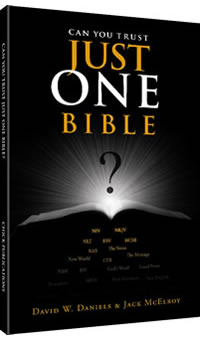Does Your Bible Contain Legends?
Some skeptics today claim that the Bible is just a collection of legends in spite of ongoing archaeological and historical research. Only the willfully ignorant still claim that Jesus did not exist.
But for 30% of the Bibles published by the United Bible Societies (UBS), they may have a point. They do contain various “legends” known as the “Apocrypha,” aka: Deutero-canonical books.
It is fascinating how God guided the preservation of His words in the hands of the Hebrews over the millennia of the Old Testament. But even there, Satan had his counterfeit scriptures. As soon as the books of the New Testament were written, Paul’s “grievous wolves” were hard at work.
To discredit the Old Testament, Greek “scholars” working for the emerging prostitute church of Rev. 17 and 18, inserted these unbiblical “legends” into the Greek translations. Then, for over a thousand years, this counterfeit church still insists that these fairy tales are part of the Bible. In fact, it needs them because they have continued to practice a number of pagan rituals based on these legends.
Purgatory, for one, is based on the Apocryphal book, 2 Maccabees 12:43-46; indulgences and praying for the dead: (paying money to forgive sins) on Tobit 12:9.1
The popes have claimed that these legends belong in the Bible because of one type of ancient Greek Old Testament called the Septuagint. Based on the fraudulent Letter of Aristeas, they claim that the Septuagint originated miraculously nearly 300 years before Christ.
Therefore, they reasoned that, since Greek was the common language of the Roman Empire, the Septuagint must have been the scriptures used by Jesus and the Apostles. Then if they used it, we should, too.
But the Septuagint contains the Apocrypha, the legends and fairy tales that none of the New Testament writers recognized as part of the Hebrew Old Testament. But this did not stop the counterfeit Roman Catholic “church” from insisting over the centuries that it belongs in the Bible.
Now that the Jesuits have insinuated themselves into the Bible translation process, more and more modern translations are published containing these legends.
In fact, author David W. Daniels describes in his book, Why They Changed the Bible, how even Wycliffe Bible translators on the mission field are forced to include a translation of these legends in new Bibles upon request.
Daniels has used modern research techniques on the Internet to expose the hoax behind the use of the Septuagint. He shows that it is not old enough for Jesus to have used it. There is no evidence supporting Catholicism’s claim that it existed before the first century AD.
Therefore, their main argument that the legends of the Apocrypha belong in the Bible falls flat. Daniels’ new book, Did Jesus Use the Septuagint, explains the details of this fraud. This book adds to the series by Daniels exposing the monstrous plot by Satan to destroy our faith in our Bibles. He shows how “doubting notes,” contradictory readings, and missing verses leave the reader of most of the modern Bibles with no way to be sure he really has what God wants us to know.
Satan is again whispering, “Yea, hath God said?” like he did in Eden’s garden.
Daniels assures us that, when someone claims that the Bible contains legends, we should help them understand that, while true of modern Bibles, one Bible stands free of doubting notes, missing verses and fairy tale legends. The history of the King James Version is reliable evidence that Jesus kept His word that heaven and earth would pass, but His words would always be available (Matt 24:35, Mark 13:31, and Luke 21:33.)
1. For more on unbiblical Apocryphal teachings, see Daniels, Why They Changed the Bible, Chick Publications, pages 173-178
- See more articles on related topics:
- Bible Versions
- Apocrypha
- Modern Versions
- Counterfeit Church
Other Articles from March/April 2017:
More on Bible Versions:
Products of Interest:
-

Answers to Your Bible Version Questions
224 pages
David W. Daniels answers difficult questions about the KJV. Learn how to defend the KJV and why you can trust it. -

Can You Trust Just One Bible?
160 pages
Answers to the most common anti-KJV accusations. -

Look What's Missing!
256 pages
For years, publishers have been removing words, and even whole verses, from modern Bibles. What's missing from your Bible? Take a look! -

Is The "World's Oldest Bible" a Fake?
352 pages
Here is proof that the Sinaiticus, a supposedly ancient Bible text on which modern Bibles are based, is actually a 19th-century fake.



